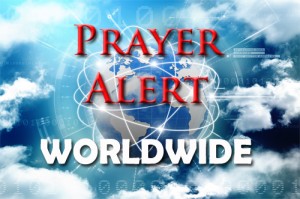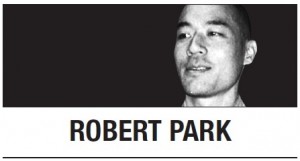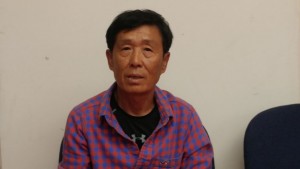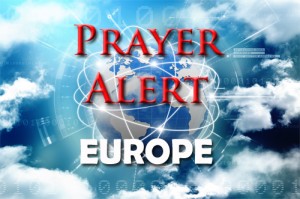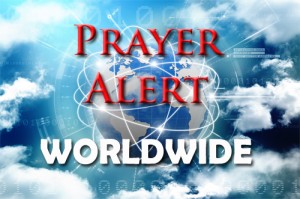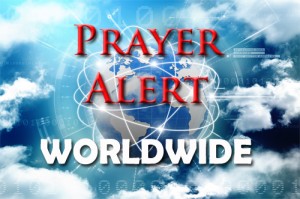Displaying items by tag: human rights
Iran: protests continue, protesters die in custody
The Iranian ministry of intelligence and security photographs demonstrations, so that the police can later arrest leaders who exhibit banners criticising the government. The regime will try to weather this latest round of protests while arresting the main agitators, and then torturing them. At least three demonstrators are believed to have been killed in custody at Evin prison, and human rights activists have raised concerns (one death was reported as a suicide, with no credible evidence to back this up). Many believe executions will come next. By 11 January over a thousand people, including nearly a hundred students, had been arrested. Windows International reports protests growing; but Iran has no press freedom, and is attempting to restrict social media which inform Iranians and the world of developments. Pray for basic human rights to be the outcome of this struggle, and for the exposure of corruption in every aspect of the Iranian government. See also:
North Korea Former prisoner pleads for peace
Dear President Trump,
Thank you for taking the time to hear my plea for peace on the Korean Peninsula.
I was a US prisoner of the Kim Jong-il regime from December 2009 to February 2010. The sole reason why I entered North Korea via Hoeryung city on Dec. 25, 2009 was to call attention to human rights violations that have occurred against innocents in the region and to demand better conditions -- conducive to life -- for North Koreans.
On a personal level, I have been profoundly wounded and suffered loss on an incalculable and irretrievable scale as a result of these efforts to highlight the North Korean populace’s severe victimization and unjust suffering. Accordingly, I sincerely beg that whatever you decide to do in concert with South Korean authorities and the international community that none of the ordinary people of both North and South Korea will ever get hurt; Koreans have already endured and sacrificed far too much.
It’s been brought to my attention that persons who have advised you and are within your administration profess to be Christians. Please kindly be reminded that a large number of underground Christians are within North Korea. They are the most persecuted religious group in the world, according to multiple watchdogs of religious rights internationally. As I pray your team accepts upon deep reflection, it would be decidedly un-Christian to countenance indiscriminate killings of those who are among the people in the world who suffer the most.
As was recorded by a 2013 United Nations Commission of Inquiry, an estimated 200,000 to 400,000 “Christians still professing their religion secretly” despite “high risks” are in North Korea today.
Another ethical dilemma vis-a-vis military strikes would be that North Korea’s political prison camps -- where thousands of Christians are imprisoned and suffering grievously -- are near weapons of mass destruction facilities and test sites.
For instance, as was written in the above-cited UN report: “Political Prison Camp No. 16 covers about 560 square kilometres of rugged terrain in Myonggan, North Hamgyong Province. It is located in close proximity to the Punggye-ri nuclear test site. ... The GeoCoordinates for the central area of Camp 16 are 41.1849N 129.2032E.”
Furthermore, an estimated 10 million Korean families were heartbreakingly severed by the brutal realities engendered through Korea’s division. Fewer than 1 percent have been permitted to see or even hear from their missing or displaced loved ones to date. As the artificial border became fixed, whether Koreans discovered themselves in the North or the South amid the tumult and upheaval of the period was in innumerable cases but a question of chance.
The South’s President Moon Jae-in -- like a multitude of South Koreans, Korean-Americans and other Koreans worldwide -- has family in North Korea.
Therefore, it is my sincere and tearful prayer that you, Mr. President, would take into serious consideration these excruciatingly painful and unresolved tragedies, while honoring the moral imperative to determine a peaceful resolution vis-a-vis the security predicament.
We must remember Kim Jong-un disallows North Koreans all of the basic freedoms most of us take for granted. North Koreans of all classes and backgrounds are not permitted to read what they wish. Neither are they able to travel freely within their own territory. Going abroad is simply out of the question for the overwhelming majority. Punishments in retaliation for being caught with books such as the Bible, or accidentally speaking out of turn or appearing irreverent, for example, are draconian and routinely deadly. These are but a few of the reasons the whole area is often referred to as a single enormous prison.
High-level escapee Thae Yong-ho, who defected to the South last year with his immediate family, characterizes North Korea as a “gigantic slave society that exists only for the hereditary succession of the Kim family.” Although once among Kim Jong-un’s most entrusted -- having been Pyongyang’s diplomat in London for 10 years -- he bravely declared subsequent to escaping, “I am very determined to do everything possible to pull down the regime to save not only my family members but also the whole North Korean people from slavery.”
There are countless individuals -- even among North Korea’s elite and military -- who confidentially share Thae’s hunger and thirst for reform and transformation within the North today. I know this with certainty.
Here is my earnest, wholehearted and tearful plea to you, Mr. President: Please unconditionally preserve the lives of both North and South Korea’s general population. Under no circumstances -- if international laws, norms and principles professing to safeguard innocents’ most sacred right to life contain any substance -- can the loss of their lives be tolerated.
There is a thoroughly workable and peaceable solution to the North Korea crisis. It involves reaching out to the general populace of North Korea in sympathy and supporting their internal unseating of Kim Jong-un -- one individual. This procedure must be accompanied by the freeing of all political prisoners -- who are victims of crimes against humanity and possibly genocide -- which can be achieved via the mediation of those North Koreans who assume interim administrative responsibilities in the immediate aftermath of Kim’s indigenous and peaceful ouster.
Elite or senior-level defections are conspicuously rising. The South’s Ministry of Unification recently reported that this year, North Korean elites -- including party officials, diplomats, and university professors -- are defecting twice as often as in 2016. Numerous members of the North’s military have been defecting to the South as of late, as well. Countless more have died while attempting to flee.
In July, an elite-level family of five -- including a former North Korean party official, his wife, son and two daughters -- struggled courageously to defect to the South. They carried poison with them to kill themselves -- as an alternative to Kim Jong-un’s systematic cruelty -- if Chinese authorities forcibly repatriated them. Heartbreakingly, these refugees deserving of protection were apprehended en route. To avoid inhumanity and torture, all five members of this senior-level family committed suicide.
As Thae Yong-ho has emphasized, high-ranking North Koreans are in actual fact slaves and are suffering gravely also.
The overwhelming majority of North Koreans hope and yearn to be reunified with the South, to live in a gentler and more egalitarian society and to bid adieu to Kim Jong-un. Those who suggest otherwise, Mr. President, unfortunately retain an inaccurate assessment of the overall situation on the ground.
Accordingly, we must reach out to the North Korean people if a peaceable solution is veritably what we seek. The native and nonviolent ousting of Kim Jong-un is distinctly achievable.
I’ve been praying through an outpouring of tears and wholeheartedly plead for you and your administration to remember the acute suffering and unparalleled victimization of tens of millions of warm-hearted, gentle and benevolent North Koreans -- who deserve compassion and require grace -- and to please pursue a peaceable answer with regard to the security quandary.
Thank you once again for your time and attentiveness to the above concerns.
By Robert Park
Robert Park is a founding member of the nonpartisan Worldwide Coalition to Stop Genocide in North Korea, minister, musician and former prisoner of conscience. He can be reached at This email address is being protected from spambots. You need JavaScript enabled to view it.. -- Ed.
North Korean defector describes 'life of hell' for Christians
North Korean Choi Kwanghyuk is one of the lucky ones.
The 55-year-old managed to escape from the work camp where he was sent after being targeted and persecuted by the government for his Christian faith.
“We couldn’t raise our voice during a service, we couldn’t sing out loud during a worship … that was hard,” Choi told Fox News through a translator. “Also, we had to hide so that other people could not see us.”
Despite having to hide his faith in plain sight while living in North Hamgyong province, Choi was still compelled to bring religion to others when he started an underground church.
“There were about nine people,” he said. “I couldn’t do mission work because we had to keep it secret that we had a church.”
“If that information had leaked, we could have faced the death penalty.”
The 55-year-old managed to escape from the work camp where he was sent after being targeted and persecuted by the government for his Christian faith.
“We couldn’t raise our voice during a service, we couldn’t sing out loud during a worship … that was hard,” Choi told Fox News through a translator. “Also, we had to hide so that other people could not see us.”
Despite having to hide his faith in plain sight while living in North Hamgyong province, Choi was still compelled to bring religion to others when he started an underground church.
“There were about nine people,” he said. “I couldn’t do mission work because we had to keep it secret that we had a church.”
“If that information had leaked, we could have faced the death penalty.”
“I never heard the term ‘underground church’ until I got here [to the U.S.].”
In 2008, North Korean authorities caught up to Choi and arrested him. He was held in prison by the state security department where he says he was interrogated about his faith.
“I was tortured there,” he said. “I kept denying it.”
He said that he was about to be sent to one of North Korea’s brutal labor camps when he was able to break free.
“I decided to escape because I thought that once they sent me to the other camp, they could eventually send me to the concentration camp or kill me,” Choi recalled. “I was traveling back and forth between China and North Korea, but they kept searching for me, and I knew it could put my friends in danger too, so I left.”
The North Korean gulag system is notorious for harsh conditions and brutal treatment of its prisoners.
Choi feared being sent to the most notorious camp within the system -- Camp 22.Also known as Hoeryong concentration camp, and part of a large system of prison camps throughout the Communist dictatorship, Camp 22 is an 87-square-mile penal colony located in North Hamgyong province where most of the prisoners are people accused of criticizing the government.
Inmates, most of whom are serving life sentences, face harsh and often lethal conditions. According to the testimony of a former guard from Camp 22, prisoners live in bunkhouses with 100 people per room and some 30 percent show the markings of torture and beatings -- torn ears, gouged eyes and faces covered with scars.
“Unfortunately, it is inexplicably easy to wind up in one of these camps. While someone can be sent to one of these camps for openly evangelizing, someone can just as easily be sent there for simply being in contact with a religious person,” said King of the International Christian Concern.
Prisoners are forced to stand on their toes in tanks filled with water up to their noses for 24 hours, stripped and hanged upside-down while being beaten or given the infamous "pigeon torture” -- where both hands are chained to a wall at a height of 2 feet, forcing them to crouch for hours at a time.
Tiny rations of watery corn porridge leave inmates on the brink of starvation, and many hunt rats, snakes and frogs for protein. Some even take the drastic measure of searching through animal dung for undigested seeds to eat. Beatings are handed out daily for offenses as simple as not bowing down in respect to the guards fast enough. Prisoners are used as practice targets during martial arts training. Guards routinely rape female inmates.
Choi said he finally escaped to neighboring China. While he was figuring out where to go next, he had heard how the general image of North Korean defectors was not positive among those in South Korea.
“So, I applied for asylum in the U.S.,” he told Fox News.
Choi, who was single when he lived in North Korea, was granted asylum in the U.S. in 2013. He first lived in Dallas before eventually moving to Los Angeles where he now lives.
Choi said that as a result of injuries he received while being tortured, he is unable to work but has committed himself to telling the world about the human rights abuses in his native land.
“First of all, every human must have the right to freedom,” he said. “There is no freedom in North Korea. By law, they have the freedom of religion and the freedom of the press, but the reality is very different.”
And despite the hardships he may face, Choi said that life in the U.S. is a vast improvement.
“There is an enormous difference between my life in North Korea and my life in the U.S,” he said.
“The life in North Korea is hell … life in America is heaven.”
Source: Fox News - http://www.foxnews.com/world/2017/10/25/north-korean-defector-describes-life-hell-for-christians.html
Crimea: human rights crimes
The UN has accused Russia of committing grave human rights violations in Crimea. There is a need for accountability. Russia annexed the peninsula from Ukraine in 2014, after that country's leader was overthrown. The UN report has documented random arrests, detentions, disappearances, torture, and at least one execution. There have been ‘intrusive law enforcement raids of private properties’, and the human rights situation has ‘significantly deteriorated’, with hundreds of prisoners illegally transferred from Crimea to Russian jails. Civil servants have been forced to renounce their Ukrainian citizenship or face losing their jobs, and Moscow has replaced Ukrainian laws with Russian ones. Education in Ukrainian has all but disappeared from Crimean schools. There was no immediate response from Russia to the report's accusations.
North Korea: release of foreign prisoners demanded
South Korea's president, Moon Jae-in, said on 20 June that North Korea should repatriate South Koreans and Americans detained in the reclusive country. American student Otto Warmbier, arrested for theft of a political notice while visiting North Korea as a tourist, was held prisoner for 17 months. He has died at a Cincinnati hospital just days after being released from captivity - in a coma, his parents said. Doctors caring for him said he had extensive brain damage. Three other United States citizens (ethnic Koreans) and six South Koreans remain in custody. President Moon deplored North Korea’s lack of respect for human rights, and said his government will make every effort to obtain the return of the detainees. US President Donald Trump blamed the ‘brutality of the North Korean regime’ for Mr Warmbier’s death. Several of those detained are Christian missionaries charged with subversion. North Korea defends its ‘sovereign right to ruthlessly punish’ US citizens held for crimes against the state.
Israel: UK puts UN Human Rights Council (UNHRC) ‘on notice’
Last week UNHRC issued five resolutions against Israel, including accusations against its activities in the Golan Heights. The British ambassador to the UN said, ‘Israel has a population of eight million, in a world of seven billion. Yet since its foundation UNHRC has adopted 135 country-specific resolutions; 68 of them have been against Israel. Justice is blind and impartial. The selective focus on Israel is neither. So today we put the Human Rights Council on notice. If things do not change, in future we will adopt a policy of voting against all resolutions concerning Israel’s conduct in the occupied Syrian and Palestinian territories.’ He added, ‘Peace is built through trust and goodwill on all sides. Human rights violations break down that trust. By continuing an unacceptable pattern of bias, the Council discredits its voice and hardens positions on both sides.’
